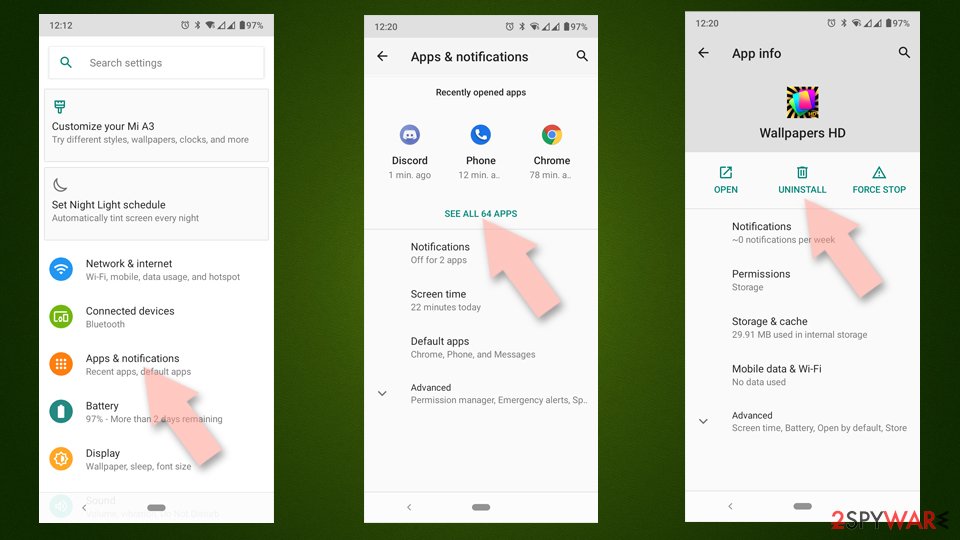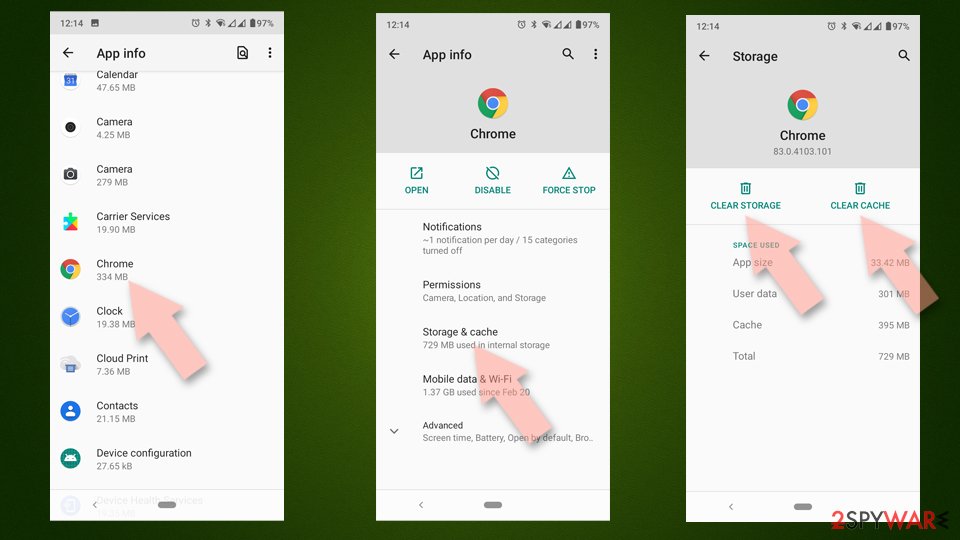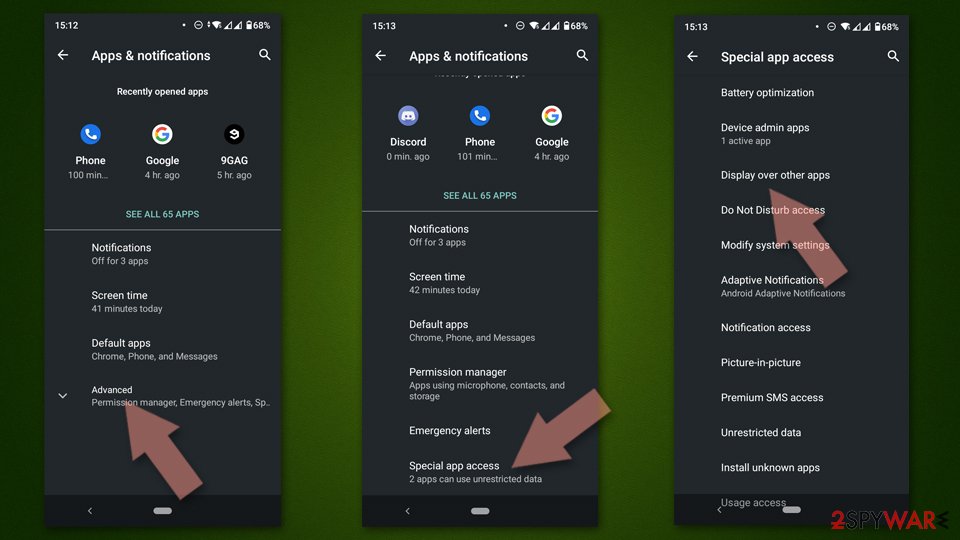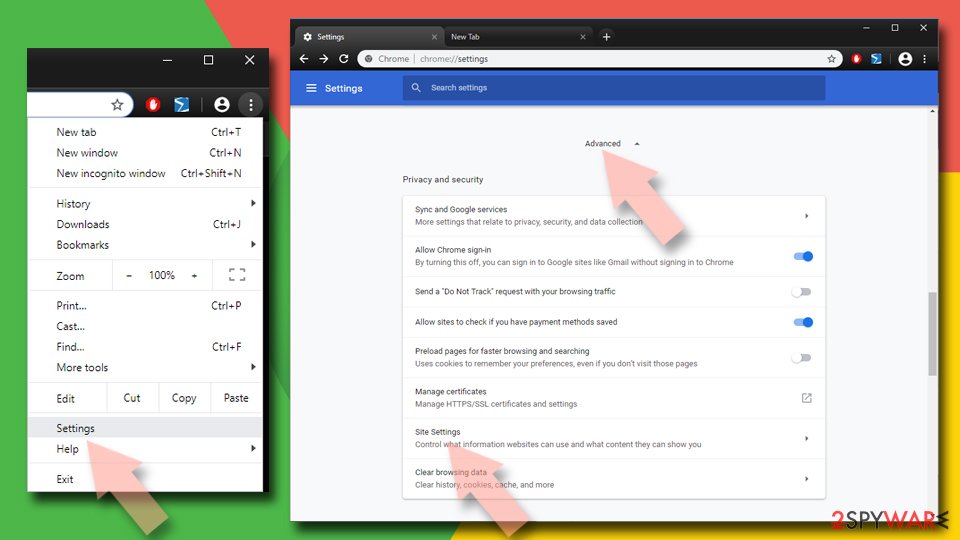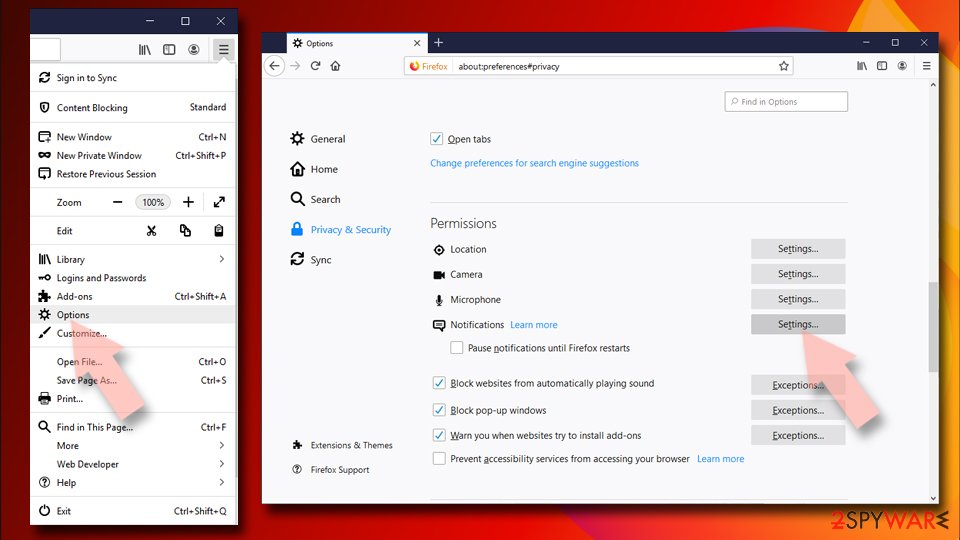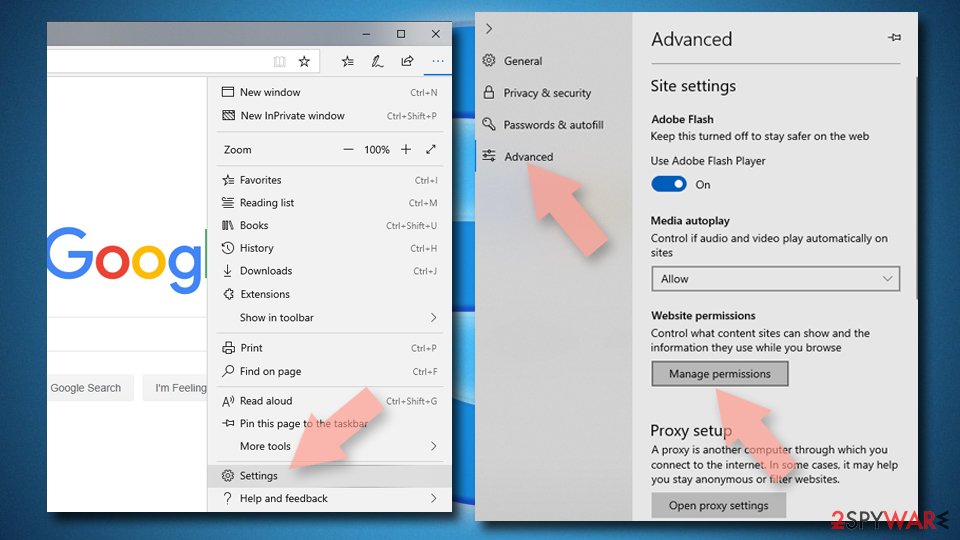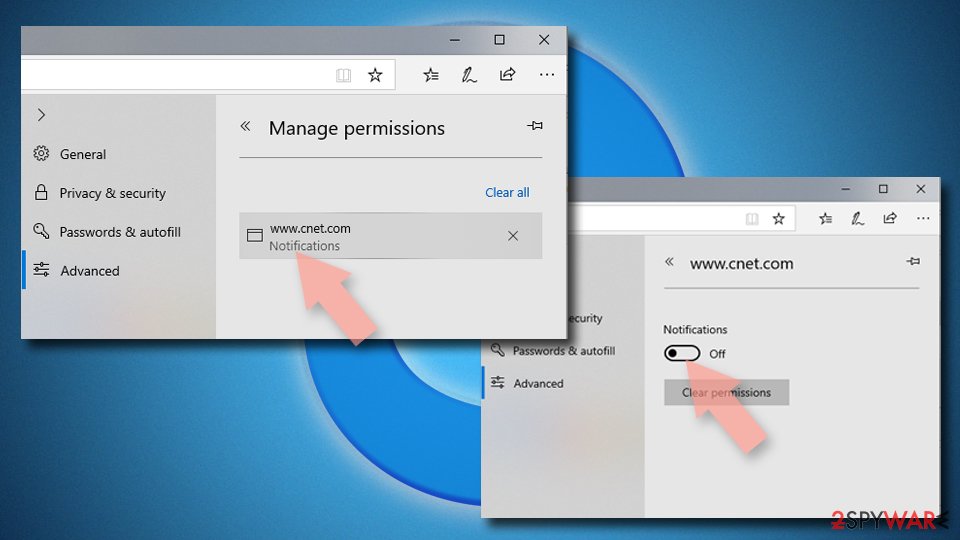AllMusicSearches (Removal Guide) - Chrome, Firefox, IE, Edge
AllMusicSearches Removal Guide
What is AllMusicSearches?
AllMusicSearches – a browser hijacker that records browsing habits and shows ads in search results

AllMusicSearches is a potentially unwanted program[1] that will show altered search results from a search engine of its choice. It does that by modifying browser preferences, such as the default search engine, new tab, and homepage. When this browser is installed either as an extension or an app, all search inquiries are redirected through feed.allmusicsearches.com to either Searchlee, Bing, Yahoo, or other sources, depending on your geolocation.
AllMusicSearches redirect enables it to collect various non-personal user and device information. In addition to forcing you into using a search engine of its choice, this browser intruder will insert ads into search results. Deceptive content could bring the most harm.
Displayed ads might cause redirects to questionable or even malicious pages. Thus this PUP should never be installed or used. By reading this article, you'll discover how the culprit and other similar PUPs function, how they're distributed, how to eliminate them and restore your device's system health.
| name | AllMusicSearches |
|---|---|
| type | Redirect virus, browser hijacker, PUP |
| Promoted fake search site | portal.allmusicsearches.com, feed.allmusicsearches.com |
| IP address | 104.21.61.248 |
| Altered browser settings | Homepage, new tab, default search engine |
| Symptoms | Redirects to questionable sites, all search traffic going through a different search engine, search results littered with ads, slower browsing speed, sluggish device performance |
| Risks | Financial losses, identity theft, privacy issues, malware infections |
| Distribution | Freeware bundles, deceptive ads, fake Flash Player updates |
| Removal | Scan your infected device with a trustworthy anti-malware tool to eliminate any cyber threats automatically |
| System health | It would help if you used the powerful FortectIntego system repair tool to fix any system-related issues and wipe out tracking cookies |
AllMusicSearches virus might be advertised as a tool that will help you find songs much faster and improve browsing quality, internet speed, privacy, security, or other non-sense. It doesn't do anything as it's advertised. In fact, it does the exact opposite.
AllMusicSearches browser hijacker will slow down the device it's installed on, contest the internet connection, cause privacy issues by gathering browsing-related data. Furthermore, it could even endanger your security by forcing you to visit various hazardous affiliated portals, including but not limited to:
- push notification viruses,
- malware,
- porn,
- gambling,
- fake updates, etc.
All PUP operators and developers care about is money. So they will advertise websites whichever pay the most. That could mean that websites using drive-by download technology that instantly installs malware onto your device could be one of them.

Therefore, you should remove AllMusicSearches immediately. The best way to do it is by performing an entire system scan with a reliable anti-malware tool. Proper security tools like SpyHunter 5Combo Cleaner and Malwarebytes will automatically detect, isolate, and eliminate any questionable or suspicious files.
Although that's not enough. To finish AllMusicSearches removal, you need to delete it from the Registry and other core system directories and settings. IT experts[2] highly recommend doing that with a time-proven all-in-one FortectIntego system repair tool. PUP leftovers could cause BSoDs,[3] freezing, severe lags, etc.
Be cautious of deceptive ads and fake Flash Player updates
Unwanted toolbars, adware, browser hijackers, and other PUPs are delivered in a stealthy manner because people seldomly install them of their own volition. Cybercriminals tend to use deceptive advertising to spread their worthless but harmful creations.
PUPs can be falsely advertised as handy system tools that would improve your browsing quality or some aspect of your device. Furthermore, you might encounter pop-ups stating that a virus infects your machine or that your Flash Player is out of date and you need to download an update right away.
All these claims are lies deliberately created to trick users into downloading whatever is offered. Please remember that no website can identify whether your device is infected or has some outdated software. These are pure lies made up to distribute potentially unwanted programs.

Guidelines on how to remove AllMusicSearches virus from infected devices
AllMusicSearches virus is a nasty creation that might only cause harm. Since potentially unwanted programs usually advertise one another, the device with a browser hijacker might soon be overrun with adware, unnecessary toolbars, or even malware.
Thus it would be best if you didn't hesitate for a second before beginning AllMusicSearches removal process. First, you need to update the virus signatures of your security tool. Then scan the entire system. When the scan is done, continue with what your anti-malware tool recommends to eliminate.
Afterward, use our free instructions below to AllMusicSearches from your browsers if it's installed as a browser extension. And lastly, perform system diagnostics with compatible system repair software to delete traces of the browser hijacker from your system and eliminate all tracking cookies.
You may remove virus damage with a help of FortectIntego. SpyHunter 5Combo Cleaner and Malwarebytes are recommended to detect potentially unwanted programs and viruses with all their files and registry entries that are related to them.
Getting rid of AllMusicSearches. Follow these steps
Uninstall from Windows
Instructions for Windows 10/8 machines:
- Enter Control Panel into Windows search box and hit Enter or click on the search result.
- Under Programs, select Uninstall a program.

- From the list, find the entry of the suspicious program.
- Right-click on the application and select Uninstall.
- If User Account Control shows up, click Yes.
- Wait till uninstallation process is complete and click OK.

If you are Windows 7/XP user, proceed with the following instructions:
- Click on Windows Start > Control Panel located on the right pane (if you are Windows XP user, click on Add/Remove Programs).
- In Control Panel, select Programs > Uninstall a program.

- Pick the unwanted application by clicking on it once.
- At the top, click Uninstall/Change.
- In the confirmation prompt, pick Yes.
- Click OK once the removal process is finished.
Remove from Microsoft Edge
Delete unwanted extensions from MS Edge:
- Select Menu (three horizontal dots at the top-right of the browser window) and pick Extensions.
- From the list, pick the extension and click on the Gear icon.
- Click on Uninstall at the bottom.

Clear cookies and other browser data:
- Click on the Menu (three horizontal dots at the top-right of the browser window) and select Privacy & security.
- Under Clear browsing data, pick Choose what to clear.
- Select everything (apart from passwords, although you might want to include Media licenses as well, if applicable) and click on Clear.

Restore new tab and homepage settings:
- Click the menu icon and choose Settings.
- Then find On startup section.
- Click Disable if you found any suspicious domain.
Reset MS Edge if the above steps did not work:
- Press on Ctrl + Shift + Esc to open Task Manager.
- Click on More details arrow at the bottom of the window.
- Select Details tab.
- Now scroll down and locate every entry with Microsoft Edge name in it. Right-click on each of them and select End Task to stop MS Edge from running.

If this solution failed to help you, you need to use an advanced Edge reset method. Note that you need to backup your data before proceeding.
- Find the following folder on your computer: C:\\Users\\%username%\\AppData\\Local\\Packages\\Microsoft.MicrosoftEdge_8wekyb3d8bbwe.
- Press Ctrl + A on your keyboard to select all folders.
- Right-click on them and pick Delete

- Now right-click on the Start button and pick Windows PowerShell (Admin).
- When the new window opens, copy and paste the following command, and then press Enter:
Get-AppXPackage -AllUsers -Name Microsoft.MicrosoftEdge | Foreach {Add-AppxPackage -DisableDevelopmentMode -Register “$($_.InstallLocation)\\AppXManifest.xml” -Verbose

Instructions for Chromium-based Edge
Delete extensions from MS Edge (Chromium):
- Open Edge and click select Settings > Extensions.
- Delete unwanted extensions by clicking Remove.

Clear cache and site data:
- Click on Menu and go to Settings.
- Select Privacy, search and services.
- Under Clear browsing data, pick Choose what to clear.
- Under Time range, pick All time.
- Select Clear now.

Reset Chromium-based MS Edge:
- Click on Menu and select Settings.
- On the left side, pick Reset settings.
- Select Restore settings to their default values.
- Confirm with Reset.

Remove from Mozilla Firefox (FF)
Remove dangerous extensions:
- Open Mozilla Firefox browser and click on the Menu (three horizontal lines at the top-right of the window).
- Select Add-ons.
- In here, select unwanted plugin and click Remove.

Reset the homepage:
- Click three horizontal lines at the top right corner to open the menu.
- Choose Options.
- Under Home options, enter your preferred site that will open every time you newly open the Mozilla Firefox.
Clear cookies and site data:
- Click Menu and pick Settings.
- Go to Privacy & Security section.
- Scroll down to locate Cookies and Site Data.
- Click on Clear Data…
- Select Cookies and Site Data, as well as Cached Web Content and press Clear.

Reset Mozilla Firefox
If clearing the browser as explained above did not help, reset Mozilla Firefox:
- Open Mozilla Firefox browser and click the Menu.
- Go to Help and then choose Troubleshooting Information.

- Under Give Firefox a tune up section, click on Refresh Firefox…
- Once the pop-up shows up, confirm the action by pressing on Refresh Firefox.

Remove from Google Chrome
Delete malicious extensions from Google Chrome:
- Open Google Chrome, click on the Menu (three vertical dots at the top-right corner) and select More tools > Extensions.
- In the newly opened window, you will see all the installed extensions. Uninstall all the suspicious plugins that might be related to the unwanted program by clicking Remove.

Clear cache and web data from Chrome:
- Click on Menu and pick Settings.
- Under Privacy and security, select Clear browsing data.
- Select Browsing history, Cookies and other site data, as well as Cached images and files.
- Click Clear data.

Change your homepage:
- Click menu and choose Settings.
- Look for a suspicious site in the On startup section.
- Click on Open a specific or set of pages and click on three dots to find the Remove option.
Reset Google Chrome:
If the previous methods did not help you, reset Google Chrome to eliminate all the unwanted components:
- Click on Menu and select Settings.
- In the Settings, scroll down and click Advanced.
- Scroll down and locate Reset and clean up section.
- Now click Restore settings to their original defaults.
- Confirm with Reset settings.

Delete from Safari
Remove unwanted extensions from Safari:
- Click Safari > Preferences…
- In the new window, pick Extensions.
- Select the unwanted extension and select Uninstall.

Clear cookies and other website data from Safari:
- Click Safari > Clear History…
- From the drop-down menu under Clear, pick all history.
- Confirm with Clear History.

Reset Safari if the above-mentioned steps did not help you:
- Click Safari > Preferences…
- Go to Advanced tab.
- Tick the Show Develop menu in menu bar.
- From the menu bar, click Develop, and then select Empty Caches.

Uninstall from Android
Uninstall unwanted programs from Android device:
- Go to Settings -> Apps/Applications.
- Expand the full list of the installed apps.
- Scroll through the list and tap on a suspicious application once.
- Tap on it and select Uninstall.

- Reboot the device.
Clear Storage and data files on Android from Google Chrome or other apps:
- Go to Settings > Apps/Applications.
- Expand the full list of the installed apps.
- Tap on Chrome and select Storage & cache.
- Clear storage and clear cache of the app.

If you are seeing ads on top of other apps but are not sure what is causing it, perform the following steps:
- Go to Apps/Applications.
- Tap Advanced.
- Select Special App access.
- Tap on Display over other apps.

- Eliminate apps with these access rights enabled.
Stop browser notifications
Remove unwanted notifications from Google Chrome (desktop):
- Open Google Chrome browser and go to Menu > Settings.
- Scroll down and click on Advanced.
- Locate Privacy and security section and pick Site Settings > Notifications.

- Look at the Allow section and look for a suspicious URL.
- Click the three vertical dots next to it and pick Block. This should remove unwanted notifications from Google Chrome.

Remove unwanted notifications from Google Chrome (Android):
- Open Google Chrome and tap on Settings (three vertical dots).
- Select Notifications.
- Scroll down to the Sites section.
- Locate the unwanted URL and toggle the button to the left (Off setting).

Remove unwanted notifications from Mozilla Firefox:
- Open Mozilla Firefox and go to Menu > Options.
- Click on Privacy & Security section.
- Under Permissions, you should be able to see Notifications. Click the Settings button next to it.

- In the Settings – Notification Permissions window, click on the drop-down menu by the URL in question.
- Select Block and then click on Save Changes. This should remove unwanted notifications from Mozilla Firefox.

Remove unwanted notifications from Safari:
- Click on Safari > Preferences…
- Go to the Websites tab and, under General, select Notifications.
- Select the web address in question, click the drop-down menu and select Deny.

Remove unwanted notifications from MS Edge:
- Open Microsoft Edge, and click the Settings and more button (three horizontal dots) at the top-right of the window.
- Select Settings and then go to Advanced.
- Under Website permissions, pick Manage permissions and select the URL in question.

- Toggle the switch to the left to turn notifications off on Microsoft Edge.

Remove unwanted notifications from MS Edge (Chromium):
- Open Microsoft Edge, and go to Settings.
- Select Site permissions.
- Go to Notifications on the right.
- Under Allow, you will find the unwanted entry.
- Click on More actions and select Block.

Remove unwanted notifications from Internet Explorer:
- Open Internet Explorer, and click on the Gear icon at the top-right of the window.
- Select Internet options and go to the Privacy tab.
- In the Pop-up Blocker section, click on Settings.
- Locate web address in question under Allowed sites and pick Remove.

After uninstalling this potentially unwanted program (PUP) and fixing each of your web browsers, we recommend you to scan your PC system with a reputable anti-spyware. This will help you to get rid of AllMusicSearches registry traces and will also identify related parasites or possible malware infections on your computer. For that you can use our top-rated malware remover: FortectIntego, SpyHunter 5Combo Cleaner or Malwarebytes.
How to prevent from getting browser hijacker
Stream videos without limitations, no matter where you are
There are multiple parties that could find out almost anything about you by checking your online activity. While this is highly unlikely, advertisers and tech companies are constantly tracking you online. The first step to privacy should be a secure browser that focuses on tracker reduction to a minimum.
Even if you employ a secure browser, you will not be able to access websites that are restricted due to local government laws or other reasons. In other words, you may not be able to stream Disney+ or US-based Netflix in some countries. To bypass these restrictions, you can employ a powerful Private Internet Access VPN, which provides dedicated servers for torrenting and streaming, not slowing you down in the process.
Data backups are important – recover your lost files
Ransomware is one of the biggest threats to personal data. Once it is executed on a machine, it launches a sophisticated encryption algorithm that locks all your files, although it does not destroy them. The most common misconception is that anti-malware software can return files to their previous states. This is not true, however, and data remains locked after the malicious payload is deleted.
While regular data backups are the only secure method to recover your files after a ransomware attack, tools such as Data Recovery Pro can also be effective and restore at least some of your lost data.
- ^ Potentially unwanted program. Wikipedia. The free encyclopedia.
- ^ Utanvirus. Utanvirus. Spyware news and security.
- ^ Chris Hoffman. Everything You Need To Know About the Blue Screen of Death. Howtogeek. Online computer magazine.





















